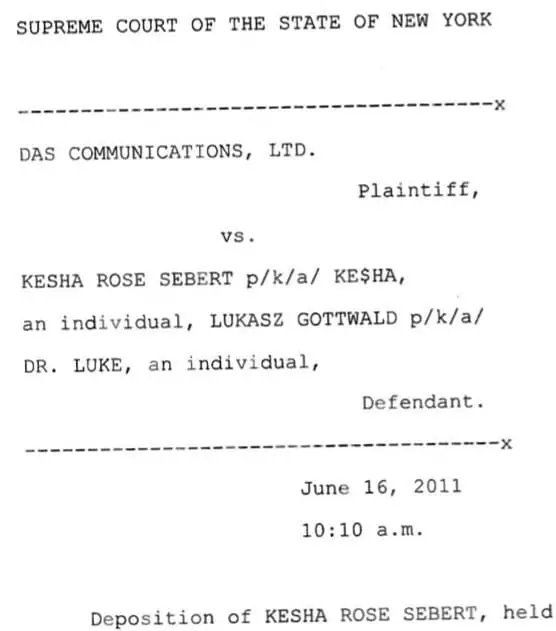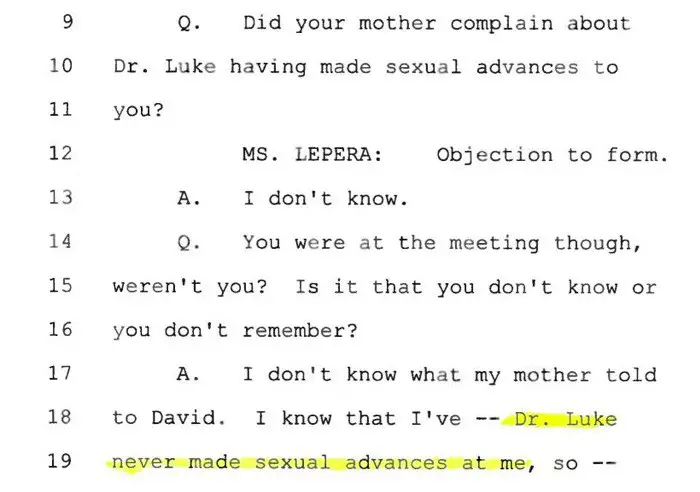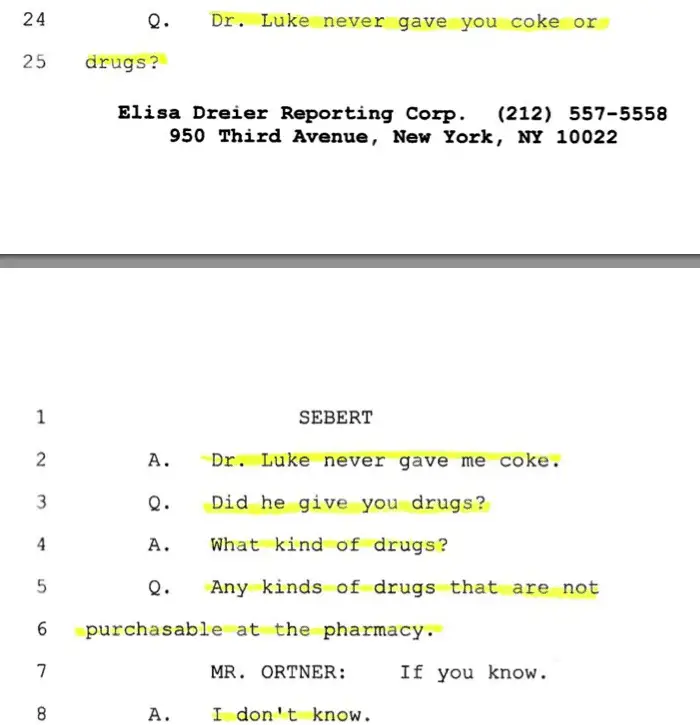Imagine being 18 years old. You're reasonably slender, you have the blonde good looks popular culture loves, you have sufficient vocal chops to pass for a singer (thanks, autotune!) and a quirky, edgy, but not threatening persona to go along with those things.
And then you meet one of the most astonishingly successful producers on the planet.
And he signs you to a multimillion dollar album deal with Sony.
He's demanding. He doesn't care what your musical sensibilities are. He knows what makes a great song, and he's invested millions of dollars into making sure you deliver what he knows the market wants.
Meet Kesha and Dr. Luke, at the center of a lawsuit surrounding Kesha's career and future with Sony Records. For those not following the story, the tl;dr is that Kesha has accused her producer, Dr. Luke, of raping and abusing her a decade ago, in the hopes of having her contract with Sony voided so she can presumably renegotiate with a different label, or even, quite possibly, renegotiate the deal with Sony.
Her injunction was denied. The deal with Sony stands.
Before we get into the veracity of Kesha's claim, let's consider for a moment the implications for contract law should Kesha have been successful. A negotiated contract, standard for the industry, is overturned based on the unproven, unsupported allegations of the signee. What can go wrong? Don't like your current mobile phone contract? Disappointed with the finance terms you signed on your latest car purchase? Not happy with the terms of your mortgage? Did your business sign a contract to deliver a product at a specificed time and meet specified conditions and now you're thinking the deal ain't that great?
What to do, what to do.
Kesha is asking the courts to agree that contracts with women can be voided the moment she is unhappy with the terms, with no evidence needed.
Just make an allegation of sexual misconduct, assault or rape, and boom – contract dissolved!
What business would ever enter into a contract with a woman if this were the reality? It boggles my mind that Kesha, her supporters and even her detractors do not seem to grasp that she is attempting to return women to pre-1900 conditions in which single women could not legally sign contracts, because they could not be held accountable for the costs incurred. Married women could sign contracts, of course, because their husbands would be liable. I am catching hella flak on Twitter for suggesting that women should not vote, and yet here are women suggesting that women should be ineligible to sign contracts!
This is beyond ridiculous. The effort of women like Kesha to relieve women of all responsibility and accountability are far, far more grievous than my modest proposal that women should not vote unless they are subjected to the draft, and yet no seems to be flinching. For some unfathomable reason, the idea that women should not be troubled with a little thing like contract law appears to trigger no reflection on what a world in which women could not contract for goods or services would look like.
What bank would agree to lend a woman money for anything if she could get out of the contract simply by screaming rape, with no evidence? What car company would sell a car to women unless it was cash on the barrel? What cell phone company would allow a woman to sign a monthly payment plan? Why even do a woman's dry-cleaning unless it was paid for up front? Why deliver pizza when she can answer the door in her pyjamas and threaten to charge the delivery driver with assault? It's like a bad porn come to life, with the roles reversed and a lot of free pizza.
Until companies wise up and understand that women only pay if they want to.
I can't think of a better strategy to limit economic and social opportunities for women than what Kesha is trying to pull off. It's utterly mad.
Let's get back to her allegations: what did Dr. Luke do to her to make Kesha afraid to work with him? Did they have a sexual relationship and what was it like? Well, according to Kesha's own words, no.
Hmm. Well, perhaps she made sexual advances to him? Perhaps under the influence of drugs he gave her, as Kesha claims now. The story was a bit different then:
Okay, so not coke, but maybe something else? Any questions as to why the judge, notwithstanding the above implications of the decision, might have thought Kesha was trying to pull a fast one, using allegations of assault to bolster her case?
Could Kesha be a woman scorned? Dr. Luke, after all, is not known for having a girlfriend and seems in no hurry to wife up. Darn!
Let's keep in mind that Sony gave Kesha the opportunity to work with other producers, although none can really match the efficacy and professional success of Dr. Luke. This was not good enough for Kesha. Sony would promote Dr. Luke and let her work languish, which prompts the question, ‘if Sony did not intend to make money from Kesha albums, why would they sink any money at all into her?" Kesha doesn't understand how business works, clearly, and assumes Sony would eat millions of dollars for what?
Spite?
That explanation makes absolutely no sense when attempting to explain Sony's motivations, but it makes a whole lot of sense when it comes to explaining Kesha's.
Hell hath no fury like a woman scorned.
Engage your furies, dear. Let them blaze! They will be as ineffectual as your case against Sony.
This is the world men have allowed women to imagine exists: stamp your feet, thrown a tantrum, squeeze out some alligator tears, tell everyone the mean man raped you and expect success. Success, had Kesha earned it, would have thrown women back a century in terms of rights. Women are practically begging to have all their rights revoked. Perhaps that should give men pause.
Listen and believe, gentlemen.
And then maybe give the lady what she wants?






The doctrine of "it's rape if she's even slightly drunk" has similar consequences. Eight months later a woman can say, "Yes, that's my signature, but this contract is null and void because I'd had two beers."
911, how may we assist you?
I'd like to report a burglary.
Yes, ma'am. When did this occur?
About 10 years ago.
10 years ago? Is this a callback? You're very patient.
It's not a callback. I'm only just reporting it now.
Just now? Why?
I'd like to get out of my lease.
What does your lease have to do with it?
Well, I don't feel safe here anymore. I guess it's kinda like delayed PTSD. Plus there's a rent-controlled apartment for half the price that just opened across the street.
I see.
When are you sending a car over?
In 10 years. [click]
"A contract is a contract is a contract", Rule of acquisition 17.
Good Article. I have read nothing but support for Kesha, and I've had the same thoughts, though not as clearly articulated. No one I know is willing to consider this might be a negotiating tactic for her.
We go 'round and 'round on all these different stories of women using and abusing the system. And yes, you are right, women way more often abuse the system than men, on average... BECAUSE THEY CAN. Yet the root cause of this is, IMHO and contrary to the current here, not inherent to females but to - yup - the system. Why do I say this? Because we will never make any sustainable traction by targeting an entire sex and blaming them for the OPPORTUNITIES the system doles out to them. Here's one for ya: line up 10 attractive women, every day, 5 times a day, in a secluded prison and let married, conservative men get to choose whether they want to bang them or not, no time limit, no chance of getting caught, in total control. Now place your bets...!!!
Do you see what I'm getting at? I think once the reality is accepted that humankind lives up to the dictum of "only as faithful as your options", in general, for both sexes, then we have a chance of rebalancing the system. Which means... yup... putting a sword through the heart of feminism 3.0, which has been indoctrinating people into this dysfunctional system of female privilege we live in today. Yet, to me at least, it's important not to confuse the real target: the system as raise and rebuild, rise and decline, empire building and decadence. Not females at large. The big question is... is there a better way?
Another well written article.
You are right too. I see Progressives unknowingly pushing for removal of rights. Even their own.
They do not realise what value is inherent in these rights.
Remove agency from women or legal culpability and of course people will seek to avoid legal wrangling by contracting with women.
Remove the ability to hear things you dislike and you stymie yourself to only having opinions not facts.
The push for segregation on campuses.
It is insane. It is becoming harder and harder for the normal people to prevent these idiots getting what they want. They keeping pushing for these ridiculous things without thinking of the consequences.
One day they will actually get what they want and then they will scream how bad the system became
The papers where I live (India) report this as rape--pure and simple.
Now her own statements, on record, prove her a liar. Will this little
detail make the news? From what I've seen of life--No.
Woman yells "Wolf!" ... and the papers print it.
Man found innocent of the charge, case dropped for lack of evidence
(usually, though of course not always, the same thing as the former) ...
and the papers "forget" the case (again, generally, not always).
Woman goes to jail for pseudo-rape? ... Yeah, keep dreaming.
On a side note: I've been looking at some articles on Wikipedia (the
"gender issues" kind). Wikipedia seems to have gone feminazi. A few
years ago, it didn't seem this bad. Now there is a "feminism portal".
Female contributors are being encouraged to pen "female oriented"
articles etc. The much-touted "Neutral Point of View" (NPOV) seems to
have become a femi-NPOV. The technical articles dealing with the
hard/mathematical-physical sciences are still good. The life-sciences
are now fricked up ... sorry, femi-fricked up.
Big-girl panties must remain fully pulled-up at all times, while engaging in big-girl activities. Diapers may be worn solely by baby girls, and only at home, in private. Change of venue must, ergo, accompany any change of undies. Nor shall thumb-sucking be permitted in adult contract negotiations.
Women need to be taught not to rape men. Failing that, men's right to keep and bear facts as a defense strategy shall not be infringed.
Gosh, but this is fun! When yer smashin' the state (or feminazism), kids, remember to keep a smile on yer lips and a song in yer heart.
Interestingly, you see some of the backlash already happening. I know of several small businesses that have flat out refused to hire a woman that was qualified for the job.
They'd had women in the past, and it was a constant struggle to deal with all their complaints, always taking time off from work, or filing false harassment claims to try and get a perceived competitor out of the running for a promotion. What company in their right mind wants to take that burden on when every study done proves conclusively that that it's an issue? A particular woman might not do that, but you can't tell which particular kind of woman you're getting just by reading a resume.
It's funny how when you ask women who claim to have been raped that they refuse to make a criminal accusation, but the moment you suggest they can make money from it, oooohhhhhhhhhhhh boy, let the water works flow. Why do people expect someone to get financial compensation for a crime there is no evidence of, or even an investigation of, just because it's a woman and she says it's rape? Can I get $200,000 out of my boss by saying he beat me 2 years ago without any sort of proof or even a criminal complain to support it? It makes no sense at all for contract law to ignore all standards of proof just because everyone is hysterical about the words "rape" and "sexual assault". Why do people expect it to? Because they're all brainwashed morons, that's why. "Rape culture" my ass. More like "rape accusation culture".
I cannot believe Sony would believe Kesha albums would make millions, who would want to buy that load of autotune? Other than that, I don't believe it is rape and any sane person wouldn't, why didn't she report it in the first place? She could have still got her album plus the sympathy. The rather mysterious Dr. Luke is no surprise either, it would probably give her a motivation to manipulate him. Pity that now not only the credibility of her voice but of her persona is no more.
Girls buy it, not boys. Girls generally are not very musical. Listen to any sort of wiener rock, apart maybe from certain species of metal. It has melody and harmony. Girls don't care or even notice that the music they listen to is crap. What they are purchasing is a look.
Aye, they're buying into the lifestyle, the fantasy that they can be just like Kesha - who can use her sexuality to feather her own nest, and also use it to destroy others if need be (like she's doing with Dr. Luke).
That's the key power fantasy for many women, especially girls: build up an air of sexuality so pervasive, it's just taken as a given, right, that men would try to help themselves to it, and thus the woman must be defended...by the men who also want to frick her.
Did anyone else, who read the Mirror link in the post, get the impression, that they were implying that Dr. Luke is gay? My take away from the "he's not known to have a girlfriend" comment was that unattached men are either gay or rapists.
Read any article where some broad is crying about how oppressed she is and there is ALWAYS some reference to how broke he is, how abusive, he's gay, is a racist, or some other sideways insult that has nothing to do with the story and is completely irrelevant.
It's the same reason that every time a black or muslim does something, they never mention race, but if the perp is white then they repeat it a hundred times. If you read politics it's the same way, if a (D) did it no mention of party, it was a (R) then it's endlessly repeated.
I don't always agree with your points, as they can be hit or miss. This is definitely a hit. This is perfect summation of what Kesha is doing. Maybe it happened, but she should have reported it when it happened. Instead, she milked it for everything its worth, and now wants to use it to get her way.
Likely it didn't happen, though I bet she slept with him. And why not, she was already selling her soul, why not her body? But I bet Kesha knows that she can use rape to publicly shame people into doing what she wants, until it was proven to her that she couldn't.
Whether the rape is true or not, I find her to be a horrible human being. In the end, this is all about money for her and she will go to any lengths to get it. She uses a horrible crime as a weapon, disregarding anyone who is a true victim of rape.